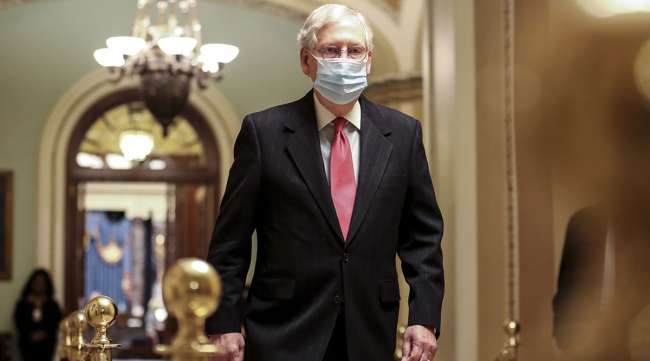Bloomberg News
All Eyes on Senate After House Backs Trump on $2,000 Checks

[Ensure you have all the info you need in these unprecedented times. Subscribe now.]
The House on Dec. 28 passed a bill replacing the $600 stimulus checks in the newly enacted virus relief bill with $2,000 payments, as Democrats and moderate Republicans voted in favor of a proposal backed by President Donald Trump.
The bill cleared the chamber on a 275-134 vote, reaching the two-thirds majority needed for the expedited procedure.
It now heads to the Senate where it will create a political dilemma for Republicans. Many of them previously opposed stimulus payments larger than the $600 in the existing law, in part over concerns about the price tag. Bumping the payments to $2,000 would cost roughly $464 billion. But Trump’s stamp of approval still has sway with GOP voters.
In addition to increasing the payment amounts and the income cutoff to receive a check, the House measure would expand the eligibility of household members who can get the money, allowing adult dependents, as well as child dependents, to receive the payments. Currently, just children of adults under the income caps qualify for the payments.
Senate Majority Leader Mitch McConnell hasn’t said whether the Senate would take up the House bill, attempt to vote on a different measure that would also increase direct payments or simply ignore the issue. Senate Democratic leader Chuck Schumer is urging Republicans to bring up a clean bill, like the House measure, to increase the payments to $2,000. Schumer is expected to seek unanimous consent to pass the House bill on Dec. 29 and to be blocked in that effort.
A vote against the increased payments would put Senate Republicans at odds with the leader of their party and on record against a politically popular idea, in a week that Republicans are trying to remain unified ahead of two crucial runoff elections in Georgia that will determine control of the Senate.
“I worry that this whopping $463 billion won’t do what’s needed, stimulate the economy or help workers get back to work,” Rep. Kevin Brady, a Texas Republican, said before the House vote. “It’s hard to stimulate the economy that is locked down by local politicians.”
The House just took a strong, bipartisan vote to pass $2,000 checks.
Tomorrow, I'll move to pass the bill in the Senate.
Workers, families, and people are crying out for help.
Every Senate Democrat is for this relief.
Senate Republicans should not stand in the way. — Chuck Schumer (@SenSchumer) December 28, 2020
The non-partisan Committee for a Responsible Budget estimates that the bigger payments would raise disposable income in the first quarter to as much as 25% above prepandemic levels. The legislation would produce an additional 1.5% in GDP output, but not all of the growth will occur in 2021, according to Marc Goldwein, an economist who co-authored the CRFB projections.
Trump last week called $600 stimulus checks a “disgrace” and asked Congress to increase them to $2,000 while cutting foreign aid and other unspecified “pork” from legislation that combines virus relief with funding for government operations. After days of complaints, Trump capitulated on Dec. 27 and signed the more-than-$2.3 trillion bill.
In a statement that accompanied his signing of the broader legislation, Trump said the Senate had agreed to begin the process of voting on the $2,000 checks along with a measure to reform unrelated liability protections for technology companies and an investigation into alleged voter fraud. McConnell hasn’t made any public statements about such an agreement.
It is not yet clear if this means Senate leaders will package these provisions together. If they do, such a bill will likely draw enough opposition from both parties to fail on the floor.
The U.S. Treasury Department could start issuing $600 direct payments beginning this week, a person familiar with the matter said. Most of the checks will likely actually go out next week.
An official said any further payments authorized by Congress after the fact will be added to what has already been paid.
In Georgia, Democratic Senate candidates Jon Ossoff and Raphael Warnock used the $2,000 payment proposal to attack GOP incumbents David Perdue and Kelly Loeffler. Loeffler said she would consider the increase if it is offset with spending cuts elsewhere; Perdue has not voiced support.
— With assistance from Jennifer Jacobs.
Want more news? Listen to today's daily briefing:
Subscribe: Apple Podcasts | Spotify | Amazon Alexa | Google Assistant | More




